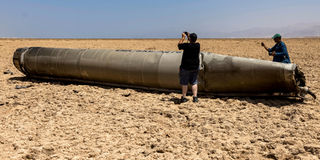Prime
Israel vs Iran: A potentially disruptive war nobody wants

Photographers film the remains of a missile that landed on the shore of the Dead Sea, a week after the missile barrage fired by Iran on April 13, on April 21, 2024. PHOTO | AFP
What you need to know:
- The enmity between Israel and Iran originates from historical shifts and ideological disparities. Formerly allies, the relationship soured after Iran’s 1979 Islamic revolution, which introduced an anti-Israel stance into Iran’s political ideology
Tensions in the Middle East flared earlier this month when Iran launched a significant missile and drone strike against Israel. The attack, numbering over 300 projectiles, marked a dramatic escalation in the ongoing regional conflict. Israel responded with a single missile strike towards Iran. Damage reported in both attacks was minimal. This exchange, however, highlighted the potential for a wider conflagration, a war that no regional power desires at this time.
The attacks follow Israel’s April 1 air strike on an Iranian consulate in Syria. The attack, which killed an Iranian military general, is seen as part of a larger Israeli strategy against Iranian targets in the region, aiming to disrupt the flow of weapons and military support to Iranian-backed armed groups in the region such as Hezbollah and Hamas. Additionally, Israel seeks to limit Iran’s military presence in the region, which it views as a growing threat to its survival.
The enmity between Israel and Iran originates from historical shifts and ideological disparities. Formerly allies, the relationship soured after Iran’s 1979 Islamic revolution, which introduced an anti-Israel stance into Iran’s political ideology. Iran openly rejects Israel’s right to exist, fostering a climate of hostility. Therefore, Israel views Iran’s clandestine nuclear programme as an existential threat. This has resulted in a prolonged shadow war, intensifying during the current conflict in Gaza.
In a significant escalation, Iran launched a barrage of more than 300 drones and cruise and ballistic missiles towards Israel on April 13. This was the first assault for Iran to launch directly from its soil to target Israeli territory. Israel’s robust air defence systems, supported by allies including the US, UK, France and Jordan, successfully intercepted 99 percent of the incoming projectiles outside or within Israeli airspace. A few ballistic missiles evaded interception, striking an air base in the Negev desert, causing a minor impact.
The nature of the Iranian attack on Israel was curious. While the sheer volume of projectiles launched was impressive, it was intended as a show rather than a strategically impactful assault. Iran’s use of inexpensive kamikaze drones and slow missiles, requiring hours to traverse the 1,000km distance between the two nations, provided ample warning for effective Israeli interception. Had Iran employed more sophisticated missiles launched from closer proximity, such as Lebanon, the impact would have been greater.
Similarly, Israel chose to respond by sending just one missile to Iran as a response. The attack hit Iran’s air defence installations in the strategic region of Isfahan, home to Iran’s military complex, with multiple nuclear facilities around. Israel didn’t want to provoke Iran into a further escalation, but in a region where showing weakness is not an option, it wished to have the last say on the matter, Iran’s tough words notwithstanding.
What is more interesting about these attacks is the fact that both Iran and Israel sent “prior” warnings to the other through diplomatic channels, Iran through Lebanon and the UK, and Israel through the US. In other words, neither Iran nor Israel was caught unawares by the attacks launched against them. Despite their deep animosity, both nations took utmost precautions to ensure the adversary wasn’t provoked to the point that all-out war became inevitable. That’s the war that no one wants. At least for now.
Israel, currently embroiled in the Gaza War and facing daily attacks from groups like the Houthis and Hezbollah, understands the grave consequences of escalating tensions with Iran. That will open not just a second battlefront but one against a far better-equipped adversary. That is something that Israel would rather avoid – at least at this point.
Israel’s major ally, the US, battle-weary from its misadventures in Iraq and Afghanistan, doesn’t want to get engaged in the region. This is an election year, and the Biden administration understands that a conflict with Iran would inflame tensions and disrupt vital energy supplies to key allies, affecting the global economy. That will not work out well for the Democrats politically.
On its side, Iran, lacking robust anti-missile defence capabilities and facing sanctions over its nuclear program, finds itself increasingly isolated in the Middle East. For years, Iran has been engaged in proxy conflicts with Saudi Arabia and its allies, and a confrontation with Israel has the potential to draw its enemies closer. That’s something Iran would wish to avoid at all costs.
Russia, Iran’s ally, shares concerns about regional destabilisation and the economic repercussions of a conflict. Preoccupied with the ongoing Ukraine War, Russia wouldn’t wish to stretch itself further. Moreover, Russia knows that the war would end Iran’s military support for Russia in Ukraine.
A war between Israel and Iran would have far-reaching consequences, affecting trade routes, energy markets, and global economic stability. Thus, even though many within Iran and Israel would cherish the opportunity to give the other a bloody nose, a war between them is not something that they need right now.
Let’s hope that cooler heads continue to prevail.
Charles Makakala is a Technology and Management Consultant based in Dar es Salaam





